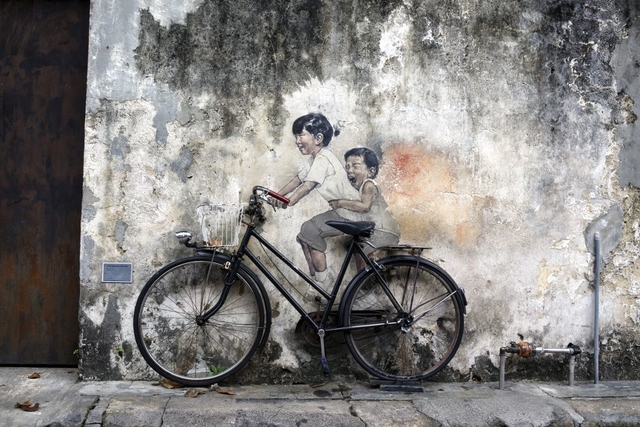
Why
Everyone's Talking About Penang
The Malaysian island of Penang is home to
approximately 750,000 permanent residents. But on weekends and public
holidays, that number swells dramatically—up to 2.5 million visitors
arrive, both from other parts of Malaysia and from abroad. Malaysians are
passionate about exploring their own country, and Penang is one of their
favorite destinations. Even more convenient now, AirAsia has recently
launched direct flights from Bali, opening the door to even more travelers.
So what makes this small island in the Malacca
Strait, located in the northwest of Malaysia, so appealing?
For visitors from the mainland, the main draw is
naturally the sea. Penang has no shortage of beaches and coastal
resorts catering to all tastes and budgets. However, it’s important to
note: Penang is not a beach holiday island in the traditional sense—you
won’t see many people swimming in the sea.
Instead, visitors come to enjoy the coastal
atmosphere in other ways: watching breathtaking sunsets, listening
to the waves, and dining at seafront cafes and restaurants. In fact, food
is one of the top reasons people visit Penang. Malaysians are passionate about
cuisine, and the island is a culinary hotspot, especially on weekends
when local tourists pour in.
Penang offers everything from upscale restaurants
to lively hawker stalls, serving some of the best street food in the
world. Don’t just take our word for it—in 2022, TasteAtlas ranked Malaysian roti
canai as the world’s best street food.
But even so, as much as food defines the Penang
experience, there’s much more to the island than just what’s on your plate.
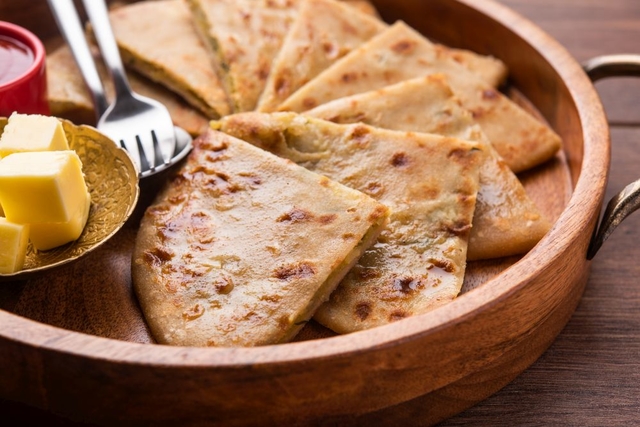
Penang is a vibrant reflection of Malaysia’s
multicultural heritage, where colonial English, Malay, Chinese, and
Indian influences seamlessly coexist. You’ll see this rich blend not just
in the architecture, but also in the food, customs, daily life, and
community spirit.
The island's charm is further deepened by its long
and storied history, dating back to the 15th century, and its diverse
natural landscapes. From coastal villages to rainforests, Penang offers a
little bit of everything.
Here, you’ll find:
- Museums and art galleries
- Buddhist and Hindu temples, Muslim mosques, and colonial churches
- Fishing villages, beaches, and tropical rainforest reserves
- Durian and nutmeg farms, rice fields, and scenic hiking trails
- Modern shopping malls and traditional markets
- A thriving food scene, from street hawker stalls to fine dining restaurants
- And a nightlife filled with bars, cafés, and cultural performances
Often referred to as the cultural capital of
Malaysia, Penang is also a hub for creativity and celebration. The island
hosts a wide range of festivals, art exhibitions, concerts, and parades
throughout the year, making it a truly dynamic destination for both residents
and travelers.
📍 Must-See Attractions in Penang
🌉 Iconic Bridges
- Penang Bridge (13.5 km) – One of two major bridges connecting the island to mainland Seberang Perai. It’s known for hosting marathons and, unfortunately, for its darker reputation as a site of suicides—prompting the creation of a state intervention commission.
- Jambatan Sultan Abdul Halim Muadzam Shah Bridge (24 km) – The longest bridge in Southeast Asia, built in 2014. Seventeen of its 24 kilometers span the sea, offering dramatic views.
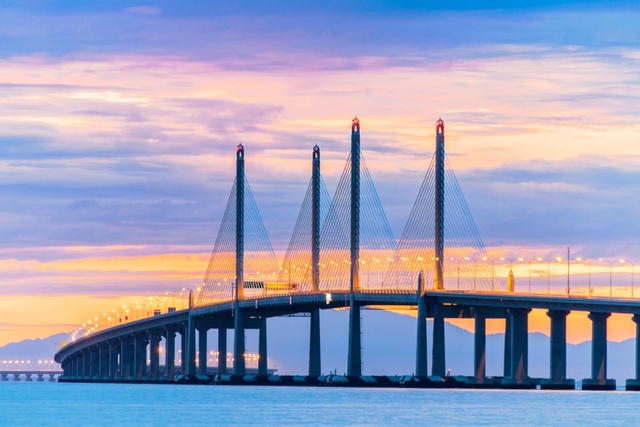
🛕 Religious & Cultural Sites
- Kek Lok Si Temple – The largest Buddhist temple in Malaysia, especially stunning during Chinese New Year when millions of colorful lights illuminate the complex.
- Leong San Tong Khoo Kongsi – A lavish Chinese clanhouse built in 1906. Penang has one of the highest concentrations of clan architecture outside China, a result of early Chinese immigration in the 1800s. On the last Saturday of each month, the building is beautifully lit and entry is free.
- Wat Buppharam Temple – A Thai Buddhist monastery founded in 1942. It houses a century-old Buddha statue, famously described by Lonely Planet as "the size of a well-fed house cat." There’s a local tradition: make a wish and try to lift the statue. If it lifts once but not twice, legend says your wish will come true.
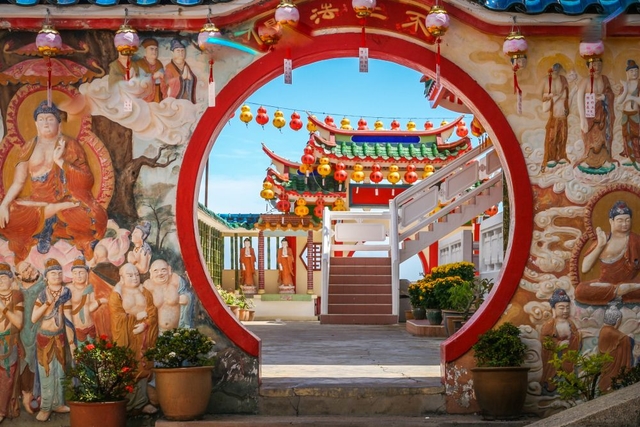
🏛️ Heritage & Architecture
- The Blue Mansion (Cheong Fatt Tze Mansion) – A striking 1880s residence turned museum, known for its bold blue façade and beautifully preserved interiors. One of the most photogenic spots in Penang.
- Pinang Peranakan Mansion – A former 19th-century residence of a wealthy Chinese merchant, now a museum with ornate, fully recreated interiors showcasing the Peranakan (Straits Chinese) lifestyle.
🏙️ Georgetown UNESCO Heritage Zone
A stroll through historic Georgetown offers a
fascinating blend of British colonial, Chinese, Malay, and Indian
architecture—a cultural mosaic unique in Southeast Asia. Don’t
miss:
- Street Art – Began in 2012 when Lithuanian artist Ernest Zacharevic created murals like Children on a Bicycle (voted the world’s best street art by The Guardian) and Boy on a Motorbike.
- Julia Volchkova’s murals, including The Praying Indian Lady and The Indian Boatman, add bold new energy to the scene.
📍 Tip: Pick up
a street art map
from the Penang Global Tourism office, hotels, or find one on Google Maps to
turn your stroll into a mini scavenger hunt.
- Hin Bus Depot – A former bus station turned art space, hosting rotating exhibitions and artist studios.
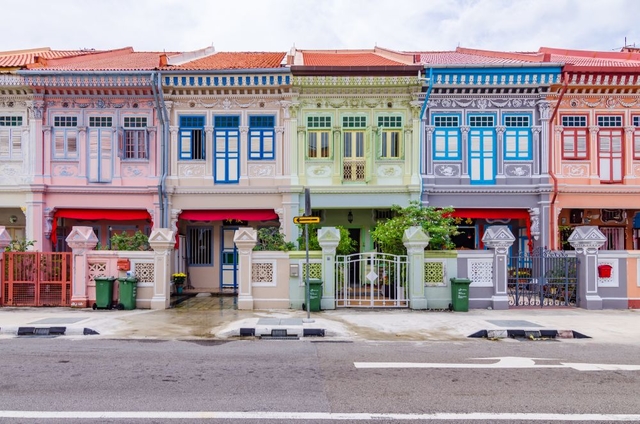
🌿 Nature, Parks & Farms
- Penang Hill & The Habitat – Located 7 km from Georgetown, this tropical reserve includes a natural canopy walk, sweeping views, and diverse flora and fauna.
- Penang Botanical Gardens – A peaceful retreat with lush greenery and walking paths.
- Spice Garden & Tropical Fruit Farm (Batu Ferringhi) – Learn about over 250 tropical plants, herbs, and fruits, including both medicinal and poisonous varieties.
- ESCAPE Theme Park – Home to the world’s longest water slide (1,111 meters) and the longest zip coaster, both certified by the Guinness World Records. 🎟️ Bonus: Visitors aged 61+ (“Super Kids”) enter free of charge.
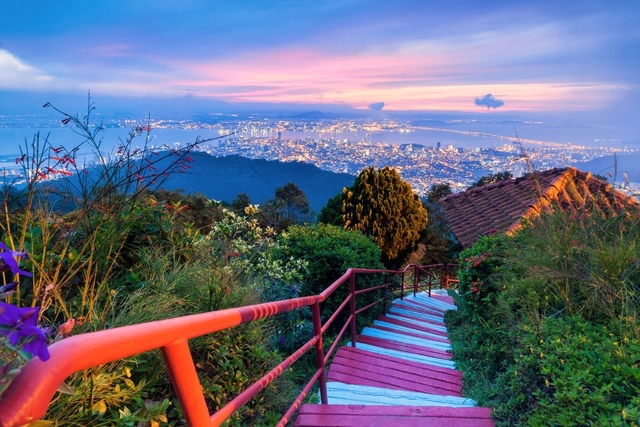
🏖️ Beaches & Coastal Escapes
- Kerachut Beach & Meromictic Lake – This hidden gem features Southeast Asia’s only meromictic lake, where freshwater and saltwater do not mix. It’s best seen in the rainy seasons (Nov–Dec, April), when it reaches full depth (~3 meters). The beach is scenic but not ideal for swimming due to strong currents.
🥾 Getting there:
Hike 4 km through Penang
National Park (Taman Negara Pulau Pinang) or take a boat from
the reserve entrance.
- Pantai Pasir Panjang – One of Penang’s best beaches, located on the quieter southwest side of the island.
🚤 Balik Pulau – “The Other Side of the Island”
Located about 40 minutes from Georgetown, Balik Pulau
is a peaceful region offering:
- Durian farms (e.g. Karuna Hill, Bao Sheng Durian Farm)
- Nutmeg orchards and rice fields
- The fishing village of Kampung Pulau Betong, a serene escape from the busier north
✈️ How to Get from Penang Airport to the City
Penang International Airport is located 18 km south of Georgetown,
the island’s capital. You have several options for getting into the city:
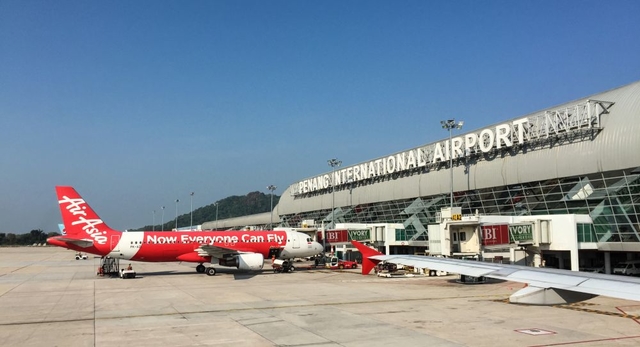
🚌 By Bus
Rapid Penang buses are an
affordable way to reach Georgetown:
- Bus numbers: 401, 401A, and 401E
- Frequency: Every 30 minutes
- Route: Airport → Komtar Bus Terminal (Jalan Penang) → Jetty (Weld Quay / Pangkalan Weld Terminal) → Lorong Chulia
- Travel time: Approximately 1 hour
- Fare: Around 3 MYR
- Last departure from airport: 10:00 PM
🗺️ Tip: You can
pick up bus route maps at the airport or main bus terminals.
In Georgetown, you’ll also find:
- Free CAT buses (see routes at rapidpg.com.my)
- Hop-On Hop-Off Buses, ideal for sightseeing
🚖 By Taxi or Ride-Hailing App
- Grab (Southeast Asia’s version of Uber) is the most convenient choice
- Airport to Georgetown: ~30 MYR
- Airport to Batu Ferringhi: ~50 MYR
🚫 Note: Uber is not available
in Penang
🚫
Tuk-tuks are
not used here. Instead, you'll find trishaws in central Georgetown,
mainly for short scenic rides around tourist areas.
🏨 Where to Stay in Penang
Most hotels are clustered in or between:
- Georgetown – Ideal for culture, food, and nightlife
- Batu Ferringhi – Known for beach resorts and nature activities
- Tanjung Tokong & Tanjung Bungah – Residential neighborhoods between Georgetown and Batu Ferringhi with easy access to both
🔁 Note: Batu Ferringhi
is 30–40 minutes by car
from Georgetown via a scenic mountain road, which may get congested during peak
hours.
Nearby attractions in the Batu Ferringhi area
include:
- ESCAPE Theme Park
- Spice Garden & Tropical Fruit Farm
- Penang
National Park (Taman Negara Pulau Pinang), where boats depart for Monkey Beach and Kerachut Beach
🍜 Where to Eat in Penang
Here’s a curated mix of local favorites and unique dining experiences
across the island:
📍 Georgetown
- Wai Kei Café (Lorong Chulia) ⏰ 11:00–14:00 daily, 6:00–21:00 (Mon–Fri)
- Goh Thew Chik Hainan Chicken Rice (338A Lorong Chulia) ⏰ 11:00–17:00 (Wed–Mon)
- Tek Sen Restaurant (18 Lorong Carnarvon) ⏰ 12:00–14:30 & 18:00–20:30 (Wed–Mon)
- Holy Guacamole (65 Love Lane) – Casual, Mexican-inspired vibe
- Lorong Baru Hawker Stalls (Jalan Macalister) ⏰ 17:00–20:30 (Thu–Tue)
📍 Gurney Drive
- Gurney Drive Hawker Centre (Persiaran Gurney) ⏰ 17:00–24:00 – Classic Penang street food
📍 Batu Ferringhi & Beyond
- Ferringhi Garden (Jalan Batu Ferringhi) ⏰ Café: 8:00–17:00 | Restaurant: 17:00–23:00
- David Brown’s Restaurant & Tea Terraces (Penang Hill) ⏰ Sky Terrace: 9:00–23:00 | Restaurant: 11:00–22:00
- Hai Boey Seafood (Teluk Kumbar) ⏰ 11:30–14:30 & 18:00–22:30 – Great for sunset seafood dinners
- Nan Guang (67 Jalan Balik Pulau) ⏰ 10:00–17:00 – Good stop while exploring the island’s west side
You can add one right now!